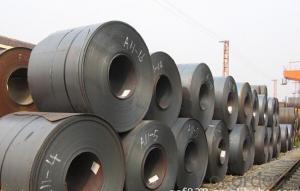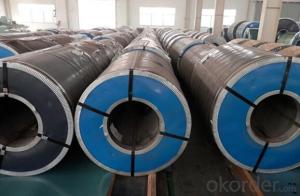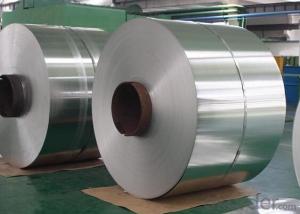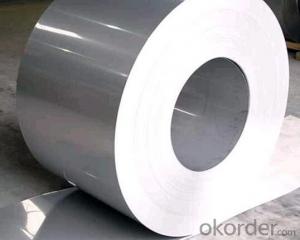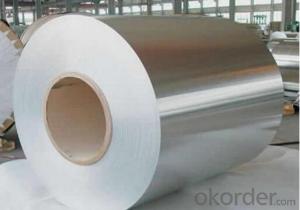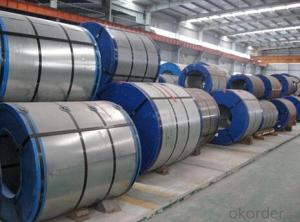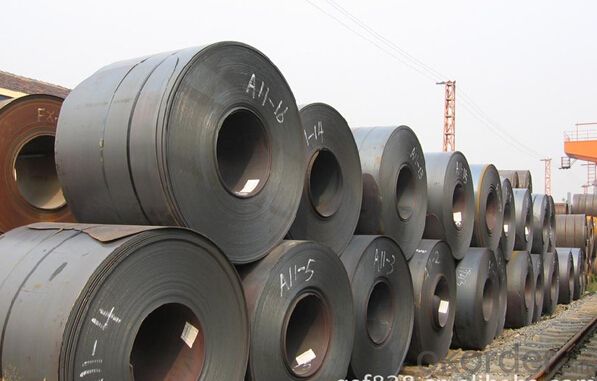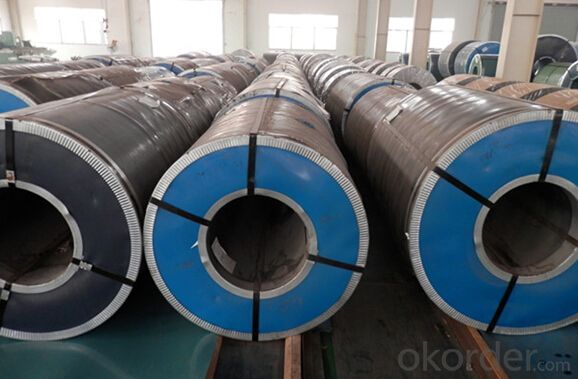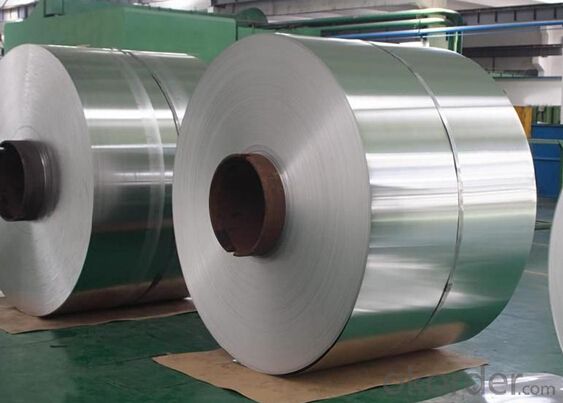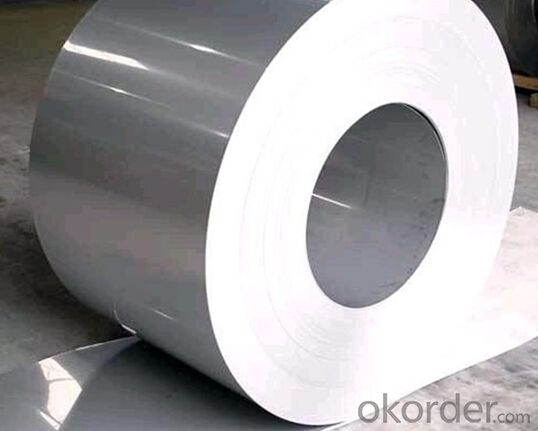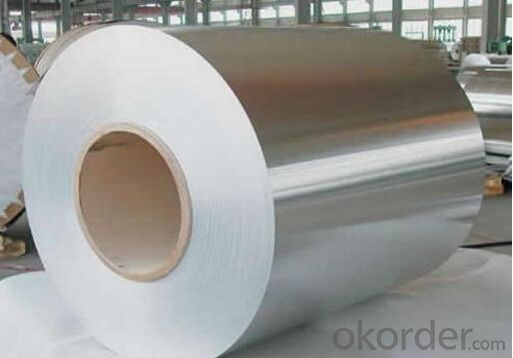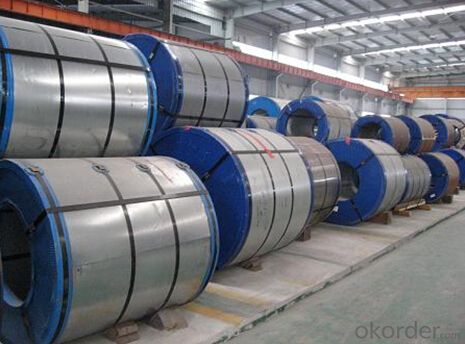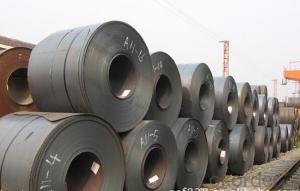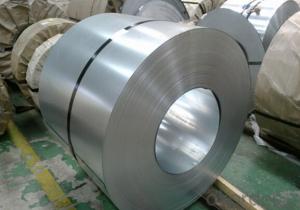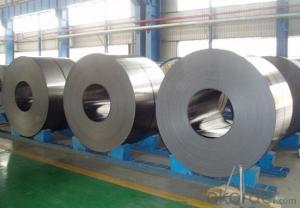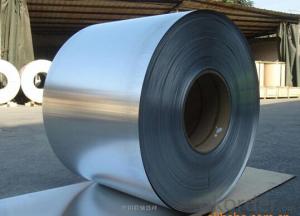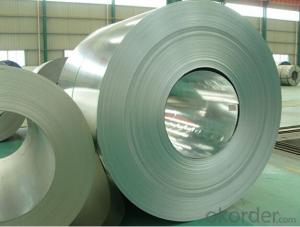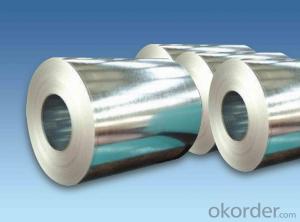Grade EN10346- DX53D+Z Galvanized Steel Coil
- Loading Port:
- Tianjin
- Payment Terms:
- TT OR LC
- Min Order Qty:
- 3 m.t.
- Supply Capability:
- 10000 m.t./month
OKorder Service Pledge
OKorder Financial Service
You Might Also Like
Specification
Grade EN10346- DX53D+Z Galvanized Steel Coil
Specification of the Grade EN10346- DX53D+Z Galvanized Steel Coil
1. Galvanized Steel Coil
(1) Width: 600-1570mm
(2) Thickness: 0.13-5.0mm
(3) Grade: JIS G3302-SGCC-SGC570, SGCH (full hard-G550), SGHC-SGH540
EN10346-DX51D+Z, DX53D+Z, S250GD-S550GD
ASTM A653-CS-B, SS255-SS550
(4) Zinc Coating: Z40g/m2~Z500g/m2 (both side total coating thickness)
2. Galvalume Steel Coil
(1) Width: 600~1500mm
(2) Thickness: 0.15~2.30mm
(3) Grade: JIS G3321-SGLCC, SGLC400-570, (G550)
EN10346-DX51D+AZ, DX53D+AZ, S250-S550
ASTM A792M CS-B, SS255-SS550
(4) AZ Coating: AZ50~AZ185g/m2
3. Prepainted Galvanized Steel Coil (PPGI)
(1) Width: 600~1250mm
(2) Thickness: 0.19~1.50mm
(3) Grade: JIS G3312-CGCC, CGC340-570, (G550)
ASTM A755M CS-B, SS255-SS550
(4) Zinc Coating: Z40g/m2~Z500g/m2 (both side total coating thickness)
4. Prepainted Galvanized Steel Coil (PPGL)
(1) Width: 600~1250mm
(2) Thickness: 0.20~1.50mm
(3) Grade: JIS G3322-CGLCC, CGLC340-570, (G550)
ASTM A755M CS-B, SS255-SS550
(4) AZ Coating: AZ50~AZ185g/m2 (both side total coating thickness)
5. Cold Rolled Steel Coil (Soft) (for further information, pls click the product name)
(1) Width: 600~1570mm
(2) Thickness: 0.13~2.50mm
(3) Grade: JIS G3141-SPCC-SD, SPCD-SD, SPEC-SD
JIS G3135-SPFC 340/390/440
EN10130-DC01, DC03, DC04
SAE1006, SAE1008
ASTM A424-TypeⅡ
6. Cold Rolled Steel Coil (Full Hard) (for further information, pls click the product name)
(1) Width: 600~1570mm
(2) Thickness: 0.13~2.50mm
(3) Grade: JIS G3141-SPCC-1B, SPCC-1D
7. Hot Rolled Steel Coil
(1) Width: 1000~1524mm
(2) Thickness: 1.20~16.5mm, other thickness can be negotiation
(3) Grade: JIS G3101-SS400, JIS G3132-SPHT1/2/3, ASTM A36, Q195, Q235 etc.
Company Introduction of the Grade EN10346- DX53D+Z Galvanized Steel Coil
CNBM International Corporation is the most import and export platform of CNBM group(China National Building Material Group Corporation) ,which is a state-owned enterprise, ranked in 270th of Fortune Global 500 in 2015.
With its advantages, CNBM International are mainly concentrate on Cement, Glass, Iron and Steel, Ceramics industries and devotes herself for supplying high quality series of refractories as well as technical consultancies and logistics solution.
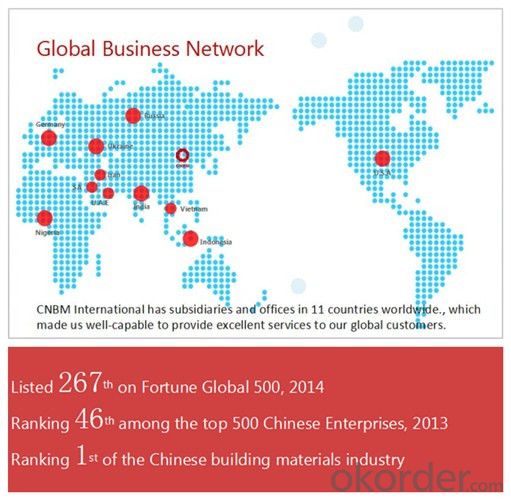
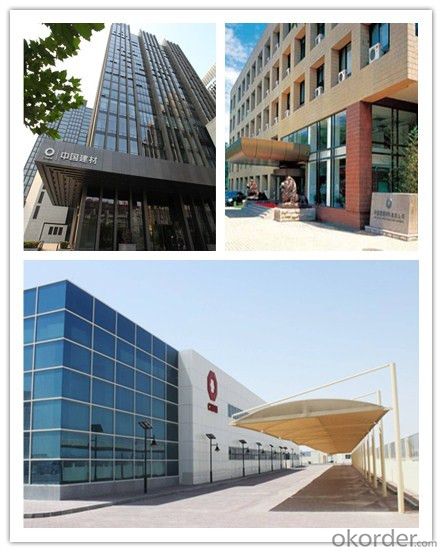
Packaging & Delivery of the Grade EN10346- DX53D+Z Galvanized Steel Coil
Packaging Detail | Sea worthy packing /as per customer's packing instruction |
Delivery Detail | 15 ~ 40 days after receiving the deposit |
Products Show:
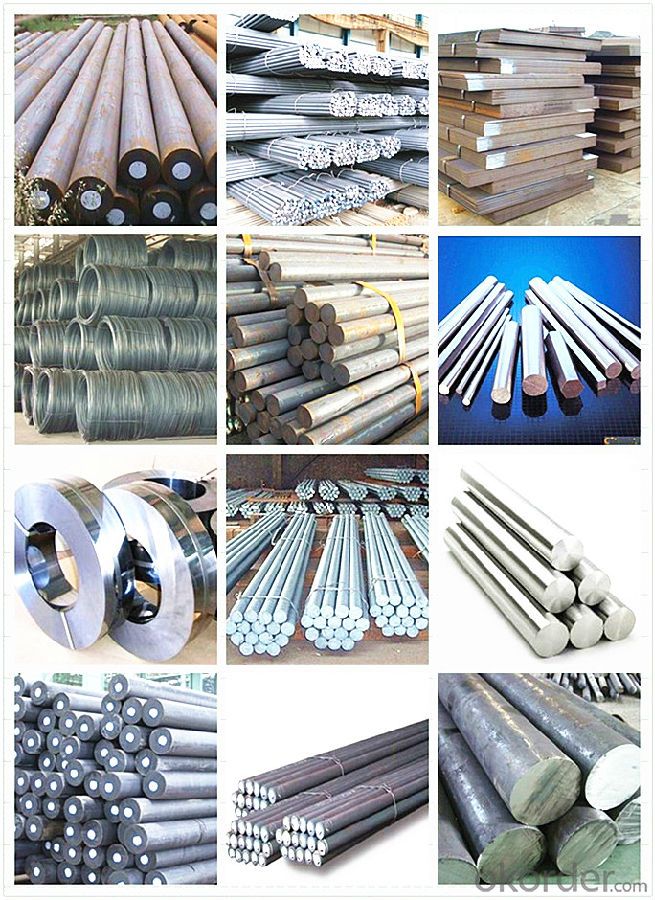
FAQ:
Are you a trading company or manufacturer? | Manufacturer |
What’s the MOQ? | 3 metric ton |
What’s your delivery time? | 15-35 days after downpayment received |
Do you Accept OEM service? | Yes |
what’s your delivery terms? | FOB/CFR/CIF |
What's the Payment Terms? | 30% as deposit,70% before shipment by T/T |
Western Union acceptable for small amount. | |
L/C acceptable for large amount. | |
Scrow ,Paybal,Alipay are also ok | |
Why choose us? | Chose happens because of quality, then price, We can give you both. Additionally, we can also offer professional products inquiry, products knowledge train (for agents), smooth goods delivery, excellent customer solution proposals. |
What's your available port of Shipment? | Main Port, China |
What’s your featured services? | Our service formula: good quality+ good price+ good service=customer's trust
|
Where are your Market? | Covering more than 160 countries in the world |
- Q: What are the different quality control measures for special steel production?
- There are several quality control measures implemented during special steel production, including rigorous inspections at various stages of the manufacturing process, such as raw material testing, chemical composition analysis, and heat treatment verification. Additionally, non-destructive testing techniques, such as ultrasonic testing and magnetic particle inspection, are employed to detect any defects or inconsistencies in the steel's structure. Furthermore, dimensional and surface quality checks are performed to ensure that the final product meets the required specifications and standards.
- Q: How does special steel contribute to reducing product recalls?
- Special steel plays a crucial role in reducing product recalls by offering enhanced durability and strength to various components and parts. Its superior properties, such as corrosion resistance, heat resistance, and high tensile strength, make it less prone to failure or breakage, ensuring the overall reliability and safety of the products. By using special steel in manufacturing processes, companies can mitigate the risk of product defects, resulting in fewer recalls and better customer satisfaction.
- Q: How does special steel perform in terms of weldability?
- Special steel generally performs well in terms of weldability. It has good ductility and can be easily welded using various welding methods such as arc welding, resistance welding, and laser welding. The composition and properties of special steel are specifically designed to ensure that it can be successfully welded without compromising its strength and integrity. However, the specific weldability of special steel may vary depending on its exact composition and specific grade. It is always recommended to consult the manufacturer's guidelines and follow proper welding procedures to achieve the best results when working with special steel.
- Q: How does special steel contribute to the renewable energy sector?
- Special steel plays a crucial role in the renewable energy sector by enabling the construction of highly efficient and durable renewable energy infrastructure. It is used in the manufacturing of wind turbine components, solar panels, and hydroelectric power systems, among others. Its exceptional strength, corrosion resistance, and ability to withstand extreme conditions make it ideal for withstanding harsh weather and environmental factors. Additionally, special steel helps optimize energy conversion and transmission, ultimately improving the overall efficiency and reliability of renewable energy systems.
- Q: Can special steel be used in the cement manufacturing industry?
- Yes, special steel can be used in the cement manufacturing industry. Special steel is often used for various applications in the cement industry, such as in the construction of kilns, crushers, mills, and other heavy-duty equipment. Its high strength, corrosion resistance, and durability make it suitable for withstanding the harsh conditions and abrasive materials involved in cement production.
- Q: What are the different corrosion-resistant coatings for special steel?
- Various corrosion-resistant coatings are available for special steel, each possessing unique properties and advantages. Some commonly used coatings include: 1. Zinc Coating: Galvanizing and other zinc coatings are widely employed to safeguard special steel against corrosion. The zinc layer acts as a sacrificial barrier, preventing corrosive elements from coming into contact with the steel. 2. Epoxy Coating: Due to their exceptional adhesion, chemical resistance, and durability, epoxy coatings are a popular choice for corrosion protection. They create a robust barrier that shields special steel from moisture, chemicals, and other corrosive agents. 3. Polyurethane Coating: In harsh environments where special steel is exposed to extreme conditions, such as offshore or marine applications, polyurethane coatings offer exceptional resistance against abrasion, chemicals, and weathering. 4. Ceramic Coating: Ceramic coatings provide outstanding corrosion protection and high-temperature resistance. They are frequently used in industries like aerospace and automotive, where special steel must withstand extreme temperatures and corrosive environments. 5. Metal Coating: Nickel or chromium coatings are frequently applied to special steel to enhance its corrosion resistance. These coatings establish a protective layer that acts as a physical barrier, preventing corrosion. 6. Powder Coating: Powder coatings are electrostatically applied and then cured under heat, resulting in a hard and durable protective layer. They offer excellent corrosion resistance and can be customized in terms of color and texture. Choosing the appropriate corrosion-resistant coating for special steel is crucial and should be based on specific requirements and the environment it will be exposed to. Factors such as temperature, exposure to chemicals or moisture, and desired coating lifespan should all be considered when selecting the suitable coating.
- Q: How does special steel contribute to the manufacturing of consumer goods?
- Special steel plays a significant role in the manufacturing of consumer goods by providing enhanced durability, strength, and performance to various products. This type of steel is engineered with specific properties and alloys to meet the high standards and demands of consumer goods manufacturing. One of the primary ways special steel contributes to the manufacturing of consumer goods is through its strength and durability. It provides a solid foundation for products that need to withstand heavy use, such as kitchen appliances, power tools, and automotive components. The strength of special steel ensures that these products can withstand daily wear and tear, resulting in increased lifespan and reduced maintenance costs for consumers. Moreover, special steel's corrosion resistance properties make it an ideal material for consumer goods that are exposed to harsh environments or moisture. This is particularly important for products like kitchen utensils, cutlery, and bathroom fixtures, as they often come into contact with water or corrosive substances. By incorporating special steel, manufacturers can ensure that their products remain rust-free and maintain their aesthetic appeal over time. In addition to strength and corrosion resistance, special steel also offers enhanced performance capabilities. For instance, it can be used in the manufacturing of consumer goods that require high heat resistance, such as cooking appliances and automotive engine components. Special steel's ability to withstand extreme temperatures without deforming or losing its properties makes it a crucial material in these applications. Furthermore, special steel's versatility allows it to be tailored to specific consumer needs. Manufacturers can choose from a wide range of special steel alloys with varying characteristics, enabling them to optimize the performance of their products. This flexibility allows for the production of customized consumer goods that meet specific requirements, whether it be lightweight materials for portable electronics or impact-resistant components for sporting equipment. Overall, special steel plays a vital role in the manufacturing of consumer goods by providing strength, durability, corrosion resistance, and enhanced performance. Its unique properties contribute to the production of high-quality products that can withstand heavy use, offer extended lifespans, and ensure customer satisfaction.
- Q: What are the common challenges in forging special steel?
- Forging special steel poses several common challenges that manufacturers and engineers must address in order to achieve desired outcomes. One of the primary challenges in forging special steel is maintaining precise temperature control throughout the process. Special steels often have specific heat treatment requirements, and any deviation from the recommended temperature range can adversely affect the final properties of the material. Achieving and sustaining the right temperature is crucial to ensure desired mechanical properties like strength, hardness, and toughness. Another challenge in forging special steel is controlling the cooling rate during quenching. Quenching is a critical step in the heat treatment process that helps to achieve the desired hardness and strength in special steels. However, rapid cooling can lead to the formation of undesirable microstructures or even cracking. Therefore, carefully managing the cooling rate is essential to avoid these issues and ensure optimal material properties. Additionally, shaping special steels through forging can be challenging due to their high strength and hardness. These materials are often more difficult to deform compared to regular steels, requiring higher forging pressures and specialized equipment. The resistance to deformation can lead to increased wear on the forging dies, requiring frequent maintenance and replacement. Furthermore, special steels may contain alloying elements that can affect their forgeability. Some alloying elements can promote grain growth, which can reduce the mechanical properties of the material. Finding the right balance of alloying elements and optimizing the forging process parameters is crucial to achieve the desired microstructure and properties in the final product. Lastly, ensuring consistency and repeatability in the forging process can be a challenge. Special steels are often produced in smaller quantities or for specific applications, making it important to maintain process control and quality assurance. Proper documentation, monitoring, and quality control measures need to be implemented to ensure that the forged special steel meets the desired specifications and performance requirements. Overall, forging special steel requires careful attention to temperature control, cooling rate during quenching, shaping difficulties, alloying elements, and maintaining consistency. Addressing these challenges through proper process control and optimization is crucial to obtain high-quality special steel products with the desired mechanical properties and performance characteristics.
- Q: How is wear-resistant steel used in mining equipment?
- Wear-resistant steel is commonly used in mining equipment to increase its durability and prolong its lifespan. It is utilized in various components such as buckets, blades, and hammers, which are subjected to intense abrasion and impact during mining operations. By incorporating wear-resistant steel, these equipment parts can withstand the harsh conditions and abrasive materials encountered in mining, reducing the need for frequent repairs or replacements and ensuring continuous productivity.
- Q: What are the key differences between special steel and tool steel?
- Special steel and tool steel possess distinct characteristics and uses. Here are the main disparities: 1. Composition: Special steel encompasses a diverse range of steel alloys tailored for specific applications. Stainless steel, high-strength alloy steel, and heat-resistant steel are some examples. In contrast, tool steel refers to a particular type of special steel designed for tool, die, and mold production. Tool steel typically contains higher levels of carbon and other alloying elements like chromium, vanadium, or tungsten, which enhance its hardness, wear resistance, and toughness. 2. Hardness and wear resistance: Tool steel stands out for its exceptional hardness and wear resistance, making it ideal for cutting, shaping, and forming materials. It can endure high temperatures and resist deformation, ensuring the longevity of tools and dies. On the other hand, special steel may not possess the same level of hardness and wear resistance as tool steel. Its properties vary depending on the specific alloy and application. Special steel alloys may prioritize other properties such as corrosion resistance or strength. 3. Manufacturing processes: Tool steel often undergoes specialized manufacturing processes like hot working, cold working, or heat treatment to achieve the desired properties. The production of tool steel involves precise temperature control and cooling rates to attain the necessary hardness and toughness. In contrast, special steel may undergo various manufacturing processes depending on the desired properties, such as forging, casting, or heat treatment. 4. Applications: Tool steel finds primary application in the production of tools, dies, and molds used for cutting, shaping, and forming materials. Industries such as automotive, aerospace, and machinery commonly utilize tool steel. Conversely, special steel has a wide range of applications depending on the specific alloy and properties. It can be employed in industries such as construction, energy, and manufacturing, where specific properties like corrosion resistance, heat resistance, or strength are required. To summarize, the key distinctions between special steel and tool steel lie in their composition, hardness, wear resistance, manufacturing processes, and applications. While special steel encompasses various steel alloys with specific properties, tool steel is a specific type of special steel tailored for tooling applications. Tool steel is characterized by its exceptional hardness and wear resistance, making it suitable for cutting and shaping materials. On the other hand, special steel can possess a broader range of properties depending on the specific alloy and application.
Send your message to us
Grade EN10346- DX53D+Z Galvanized Steel Coil
- Loading Port:
- Tianjin
- Payment Terms:
- TT OR LC
- Min Order Qty:
- 3 m.t.
- Supply Capability:
- 10000 m.t./month
OKorder Service Pledge
OKorder Financial Service
Similar products
Hot products
Hot Searches
Related keywords
